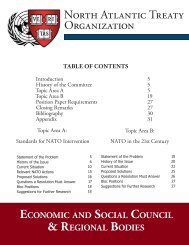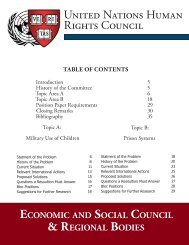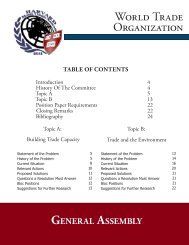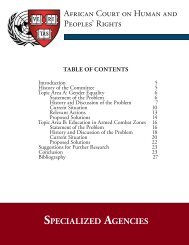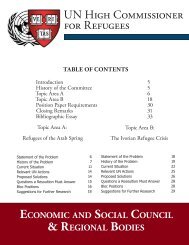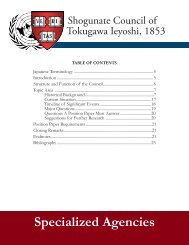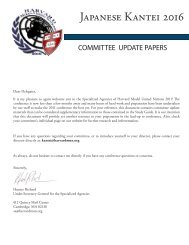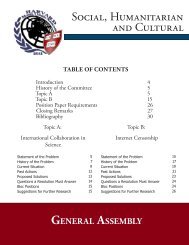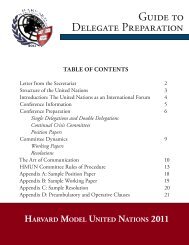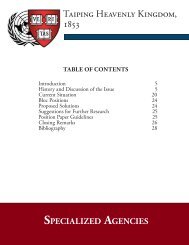Press Corps - Harvard Model United Nations
Press Corps - Harvard Model United Nations
Press Corps - Harvard Model United Nations
Create successful ePaper yourself
Turn your PDF publications into a flip-book with our unique Google optimized e-Paper software.
<strong>Press</strong> <strong>Corps</strong><br />
become clear once the conference begins). It is recommended<br />
that reporters also review the supplement to the study<br />
guide. If you have any questions, about anything relating<br />
to <strong>Press</strong> <strong>Corps</strong>, please feel free to email us at presscorps@<br />
harvardmun.org. We are looking forward to seeing you at<br />
the conference in January!<br />
Writing Supplement<br />
How Reporters Will Be Evaluated<br />
As in all other HMUN committees, evaluations<br />
of reporters will not be based on any rigid numerical<br />
grading system, but will be a holistic approach in which the<br />
following criteria are taken into consideration:<br />
1. Did the reporter submit at least three quality pieces (of<br />
any combination of media)?<br />
2. Did the reporter produce a diverse portfolio of content<br />
over the course of the conference?<br />
3. Did the reporter produce interesting news pieces that<br />
were informative, well-written, and included appropriate<br />
content and quotations?<br />
4. Were the facts included in a reporter’s piece accurate and<br />
presented in an unbiased manner?<br />
5. Did the reporter adhere to deadlines set by the <strong>Press</strong><br />
<strong>Corps</strong> staff? If the reporter did miss a deadline, did he<br />
inform <strong>Press</strong> <strong>Corps</strong> staff ahead of time and make every<br />
effort to complete his work in a timely manner?<br />
6. If a reporter had an early deadline, did he spend<br />
the remainder of committee time doing productive<br />
<strong>Press</strong> <strong>Corps</strong>-related activities (e.g. blogging, taking<br />
photographs, helping other reporters, getting a head<br />
start on his next deadline, etc.)?<br />
7. Did the reporter adhere to the style guide in producing<br />
his pieces? (Don’t worry if you make an occasional<br />
minor mistake, such as a grammatical error here and<br />
there, but pieces should generally be of professional<br />
quality.)<br />
8. Was the reporter responsive to the advice and directions<br />
of the <strong>Press</strong> <strong>Corps</strong> staff?<br />
Tips for Reporting<br />
Closer to the conference, reporters will receive an<br />
HMUN style guide with general conventions for using<br />
grammar, spelling, and punctuation in their articles. These<br />
will generally adhere to the AP style guidelines, and the<br />
<strong>Press</strong> Room will have a few copies of the AP Stylebook on<br />
hands for reporters to reference.<br />
Innovation and Technology<br />
In the meantime, here are some tips that reporters<br />
should keep in mind as they prepare to report on the<br />
conference:<br />
1. News pieces—be they print or video—should be<br />
ideologically neutral and should only report the facts.<br />
Any commentary in these pieces should come from the<br />
individuals being interviewed and not from the reporter<br />
himself. Remember, if a reporter has very strong views<br />
on an issue being discussed in committee, he can write<br />
an opinion piece instead.<br />
2. Accuracy is crucial. Be sure to quote delegates accurately,<br />
spell names of delegates and countries correctly, and<br />
check your facts online before your print them.<br />
3. The introduction of an article (also called the “lede”)<br />
should grab readers’ attention. If a story is more lighthearted,<br />
the lede should be clever or pithy, while if a<br />
story is more serious, the lede should give the main idea<br />
of what happened. After the lede, include the most<br />
important details towards the front end of the story, and<br />
expand upon them as necessary.<br />
4. In general, it’s best to use short sentences and short<br />
paragraphs. Each sentence should be concise and<br />
convey some new information, and often in news<br />
writing, paragraphs will contain only one sentence.<br />
Reporters should read news articles in preparation for<br />
the conference to get a feel of the writing style.<br />
5. All news pieces should be written in the third person,<br />
while opinion pieces can use some second- or firstperson<br />
phrases.<br />
6. Interviews are key to a good news story. Try to pick<br />
delegates who seem to be very active or who have<br />
provided either interesting or unusual perspectives.<br />
Remember, the dais staff of committees could also be<br />
interviewed and may provide an interesting angle for<br />
your story.<br />
7. Always introduce yourself when you conduct an<br />
interview. Let your subject know that you’re a member<br />
of the press and that they are speaking on-the-record.<br />
(That is, what they say might be quoted and appear in<br />
your story.)<br />
8. Get a diverse set of interviews for every story. If you<br />
only interview one person, your article is likely to seem<br />
one-sided, boring, or both. Generally, aim for having at<br />
least three interviews in all your articles.<br />
9. Prepare questions for an interview ahead of time. It can<br />
be tough to think on your feet sometime when you have<br />
to keep coming up with new questions. Don’t feel that<br />
you have to stick to the list of questions you’ve prepared<br />
ahead of time though. Feel free to engage the interview<br />
subject in a discussion and ask follow-up questions.<br />
10. Don’t ask yes-or-no questions, as these probably won’t<br />
produce very interesting quotations. Leave your<br />
11




